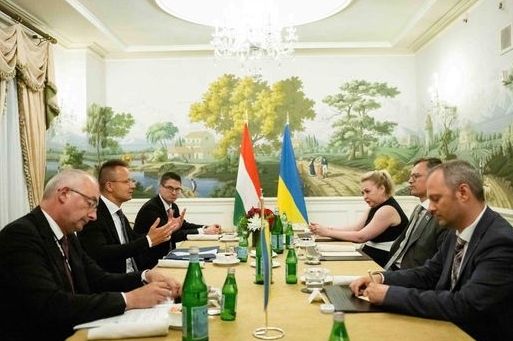The famous beach of Big Yalta will be handed over to the son of the head of the Russian Interior Ministry for construction

The “friends” of the Governor of Crimea, Sergei Aksyonov, want to give up one of the most famous beaches of Greater Yalta and the adjacent green zone for development in order to compensate the invaders for violating criminal “concepts”.
Recently, a special chatbot of the National Resistance Center, which collects information about the crimes and activities of the enemy and his accomplices, received a message about the intensification of plans to develop one of the symbolic plots of land in Greater Yalta.
We undertook to check the facts and documents presented. It turned out that this story shows not only the attitude of the current Crimean “elite” to the natural resources of the peninsula and its inhabitants, but also a very specific level of relations within the occupation administration. Now we will tell you about it.
“They are going to build Golden Beach. They have cancelled the old projects and are now running around with permits. Artur Goncharenko is organizing all this work. He is a friend of Aksyonov and ex-mayor of Yalta Rostenko, who officially does not hold any office, but everyone knows that he “decides” on land issues. We received a message from a chatbot user with roughly this content, accompanied by several screenshots with maps of the area.


According to the captions on the pictures, it can be determined that this is the territory of the sanatorium “Golden Beach”, which was located in the village of Kurpaty in the Yalta region. Despite being the most expensive land plot in Crimea, the area has been abandoned since the 1990s.
Attempts were made to privatize it, there were plans to build it, but this was not realized due to lengthy legal proceedings. Incidentally, Russia tried to use this fact in its propaganda against Ukraine. The Russians positioned themselves as “guardians of the national treasure.”
However, it seems that the “national treasure” can still be used for private purposes. This was proved thanks to documents sent by people who cared about Artur Goncharenko.
After the occupation of Crimea, Goncharenko became a collaborator and assistant to Andriy Rostenko, the first governor of Yalta during the occupation.

Subsequently, Rostenko experienced an unfortunate episode in his relations with more serious officials. He lost his job and even spent some time in a pre-trial detention center for land fraud. Goncharenko then resigned from his official post along with his boss and is now officially unemployed.
This status does not prevent him from driving a Mercedes GL-Class, although it is registered to his wife with a different surname, Yulia Muravska. He also enjoys holidays with his family in prestigious hotels.


The secret of the surprising prosperity of the unemployed collaborator Goncharenko is simple: he actually still acts as a secret mediator in solving certain land problems in the Yalta region.
Thanks to his help, we managed to find numerous presentations and documents related to the development of various objects, issues of changing the purpose of land plots or reducing the size of protected areas.
Most of the projects found are located within the boundaries of Greater Yalta. There is also a presentation on the development of the Golden Sands. It shows that two towers and another high-rise building are planned to be built right in the coastal zone, next to another well-known sanatorium, Kurpaty, which is known for its unusual architecture.



As you can see in the last picture, there is also a green area on the slope above the planned towers. And this is where the most interesting part of the Potter’s documents is connected. One of the presentations shows plans to build on this plot as well. A large recreation center is to be built there, the architectural component of which leaves much to be desired. However, the inscription “Arrow LLC” on the slides of this presentation draws attention.


Several LLCs with the same name are registered in Russia, but one of them is located in Moscow, on Letnikovskaya Street. The head of the company is a certain Artem Korotkikh, but the founder is Alexander Vladimirovich Kolokoltsev. He is none other than the son of Vladimir Kolokoltsev, the head of the Russian Ministry of Internal Affairs. The younger Kolokoltsev, according to Russian media, once worked in the structure of the Ministry of Internal Affairs, but then left the civil service to enter the business world.
They also mentioned a joint construction company with Korotko, who is from Donetsk and lived in Yalta for some time.
Now it is worth telling the details of the story about the dismissal of Goncharenko and his boss Rostenko from service in the Yalta “commune”. Rostenko was then accused of land fraud. In 2017, he quietly transferred the Alupka sanatorium from the “property” of the Russian Ministry of Internal Affairs to the “Republic of Crimea”. At the same time, the purpose of the land was changed from “sanatorium activity” to “development”. But then, it seems, Rostenko crossed the path of an influential person in Moscow. In 2018, he was arrested in this case and even sent to a pre-trial detention center. However, he was released the same year.

Later, the case was forgotten. Already in 2020, Rostenko was appointed to a new position in the occupation government – Deputy Minister of Culture of Crimea. At the same time, the personal documents of his assistant Goncharenko became more active and numerous presentations and investment proposals appeared.
The history of the plans to build Golden Beach and its surroundings shows what happened. After the “prevention” in the pre-trial detention center, Rostenko and Goncharenko are trying to “work off” their guilt in the interests of the clan of the head of the Russian Interior Ministry. As a “repentance for sins,” Kolokoltsev’s son receives one of the most expensive building plots in Crimea. The fate of ordinary Crimeans and their access to the natural resources of the peninsula are not important to the occupiers and collaborators.



